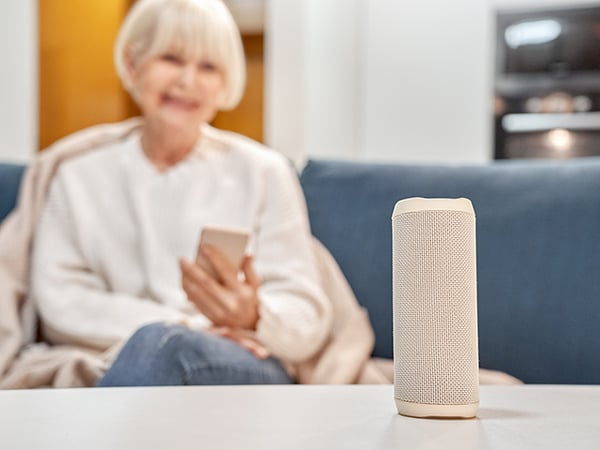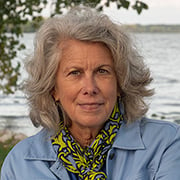Published: January 29, 2021
 After Judy Riggle’s stroke in 2018, she moved from her cottage to the Stephens Care Center at Kendal at Oberlin. Her husband Tom and cocker spaniel Susie visited daily, sometimes more than once. But when the pandemic forced Kendal to close the care center to visitors in March, Tom and Susie’s visits came to a halt.
After Judy Riggle’s stroke in 2018, she moved from her cottage to the Stephens Care Center at Kendal at Oberlin. Her husband Tom and cocker spaniel Susie visited daily, sometimes more than once. But when the pandemic forced Kendal to close the care center to visitors in March, Tom and Susie’s visits came to a halt.
Enter Echo Show and its Alexa voice assistant. The voice-command device includes a video call feature that meant Judy and Tom could easily talk via screen, no need for help once staff taught them how to use it. The device was loaned to the Riggles by Kendal.
“Yes it was a godsend. It was not so easy to get Susie on the screen but I would pick her up and try,” Tom recalls.
Judy also used the device to call family and friends and listen to music. When Judy died in November, Tom returned the device to Kendal and bought two Echos for his cottage. “I use it for time and temperature, to find out about the Indians and to listen to old country music,” he says.
According to a recent technology survey of Kendal at Oberlin residents, about 10% of respondents are using voice assistant devices in their homes. And that number is likely to grow.
Voice Technology and Older Adults
“The field of voice-first technology is still fairly new. But it is beginning to flourish thanks to the success of Amazon Echo,” Randy Rieland writes in a Next Avenue article.
In a California research project, older adults, most over the age of 80, expanded their use of Amazon Echo from listening to music and getting information to controlling lights and thermostats.
That capability gave people, particularly those with mobility issues, a greater sense of control and independence, according to Davis Park, who oversaw the research.
“They’re simple things, but these simple things can have tremendous and dramatic implications for daily living,” Park said. “It blew us out of the water at how really excited people were.”
In fact, The Helping Home came up with 21 ways Amazon Echo or Google can help older adults.
Here are 5 of them:
- Make a list, as many as you like – to-do, holiday shopping, groceries, etc. After you create a list, ask Alexa to add an item to it, or remind you what’s on it.
- Manage your calendar in much the same way – add an event, ask what’s on your calendar next week.
- Set reminders. Let Alexa remind you when it’s time to take your medicine, feed the dog, water the plants and more.
- Turn it into a night light on the way to the bathroom, turn it off when back in bed.
- Improve your mood by using Echo’s daily affirmations and meditation practices.
Other Technology for Older Adults
“No longer just for the young: 70% of seniors are now online” according to a 2019 headline.
“Survey shows seniors are embracing technology and telehealth during pandemic,” reads a recent headline.
Add to that the hundreds of headlines we’ve seen about Zoom meetings, movie streaming services, online church services and concerts that young and old have embraced. Well, as a recent Kendal blog put it, Thank Goodness for Technology! We expect that use of voice assistant technology by older adults will continue to grow. The Admiral at the Lake, another affiliate of The Kendal Corporation, has adopted use of Alexa-enabled devices for free for use in all 200 apartments of its independent living community.
Along with Echo and other voice assistants, here are some other tech products that older adults might want to check out. These are from Cheapism, an online site that independently researches products, including weeding through online reviews:
- Ring Video Doorbell, which allows you to see who’s at your door from anywhere in or outside of your house;
- LastPass, which keeps track of your passwords with only one master password to remember;
- Vizio Sound Bar, which enhances the audio of our HDTV;
- QardioArm Blood Pressure Monitor, which saves data and reminds you to take your reading.
 In the past, Molly Kavanaugh frequently wrote about Kendal at Oberlin for the Cleveland Plain Dealer, where she was a reporter for 16 years. Now we are happy to have her writing for the Kendal at Oberlin Community.
In the past, Molly Kavanaugh frequently wrote about Kendal at Oberlin for the Cleveland Plain Dealer, where she was a reporter for 16 years. Now we are happy to have her writing for the Kendal at Oberlin Community.





